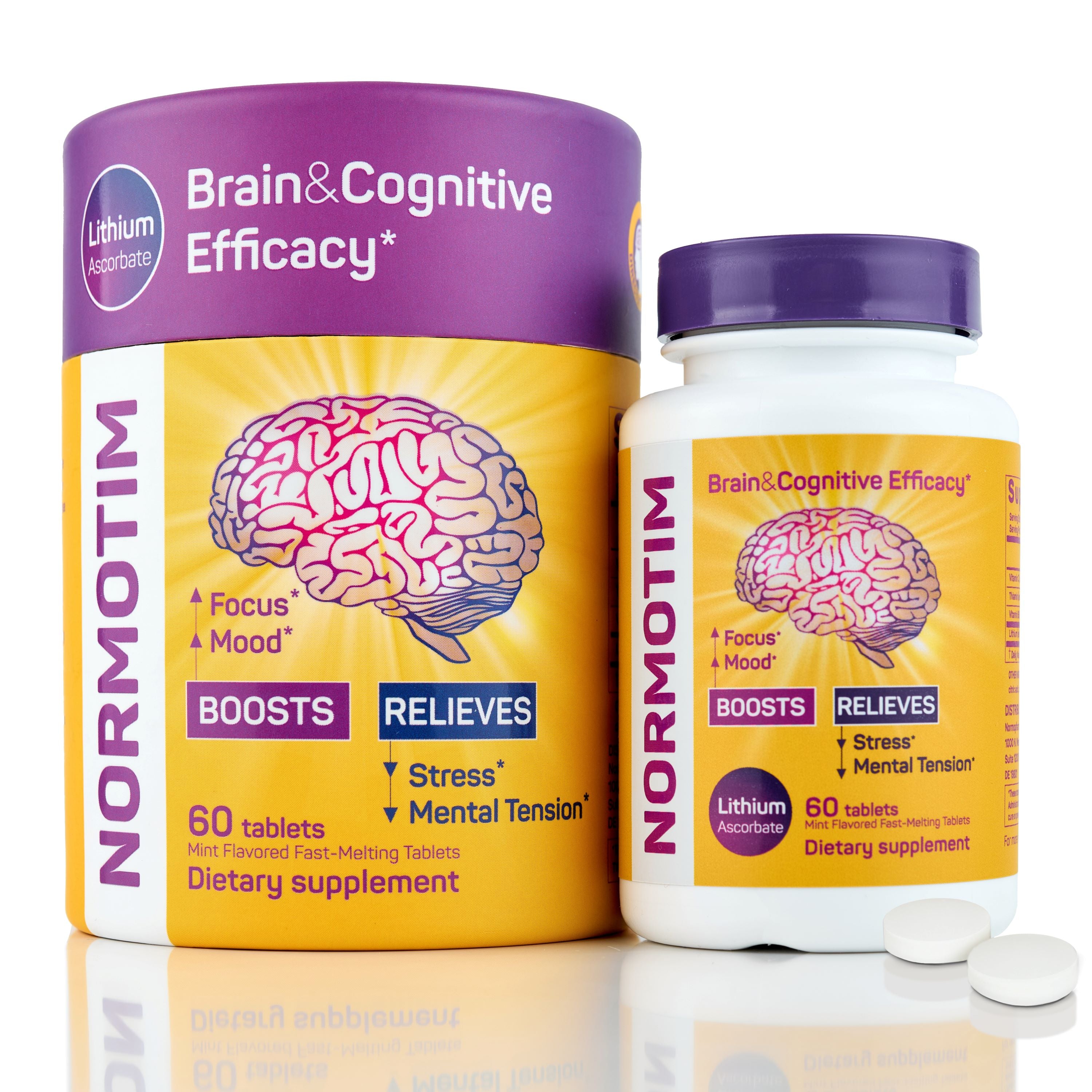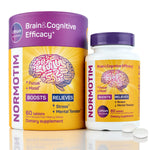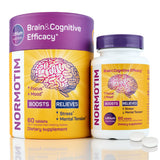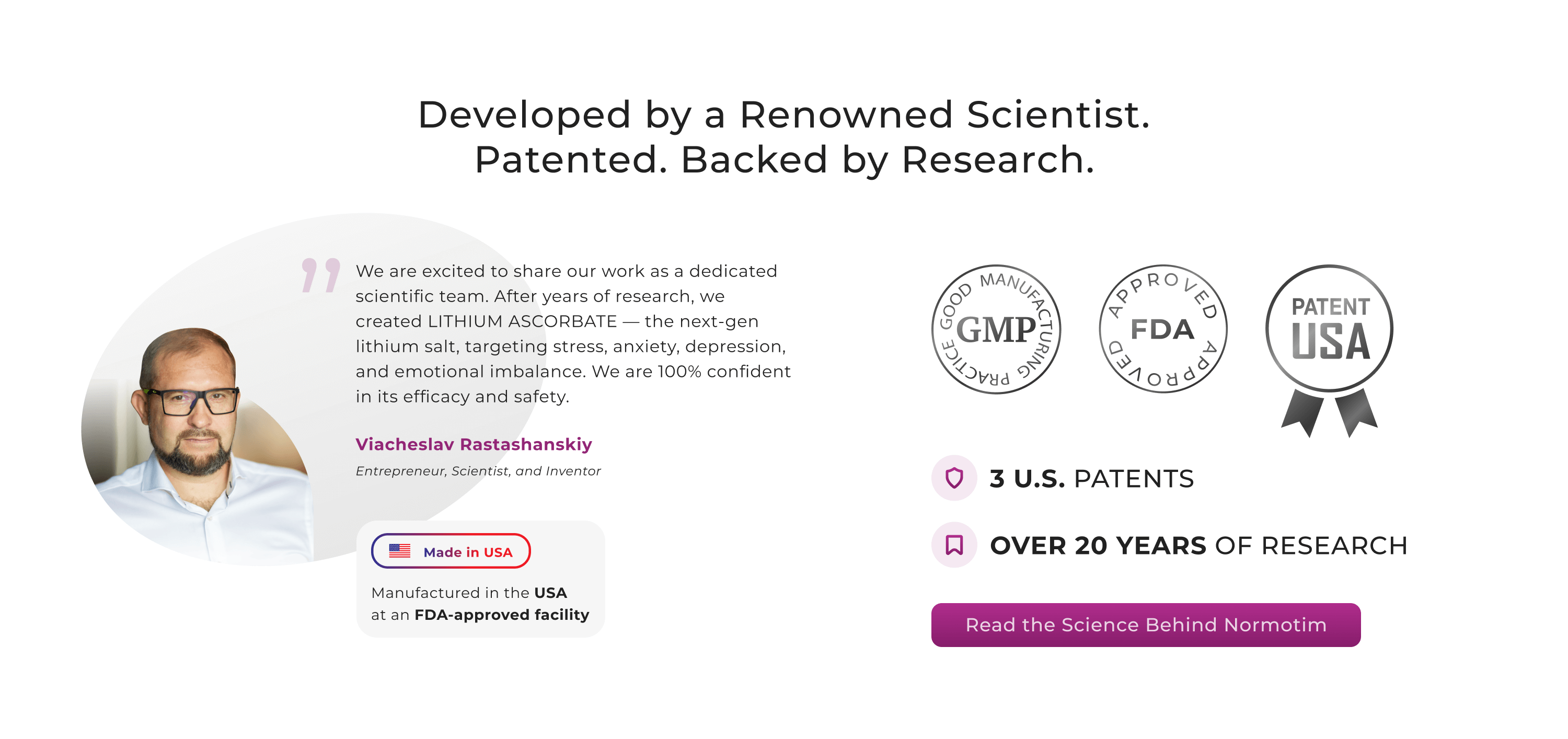THE Science
How it works
Lithium and vitamin C form a powerful duo for mental clarity, mood balance, and brain protection. Normotim delivers lithium ascorbate directly to the brain, where it reduces stress hormones, boosts BDNF by 9%, stabilizes mood, and supports emotional resilience.

Happy Customers
FAQs
Everything you want to know about Normotim, answered.
When is the best time to take it?
We recommend taking 1 tablet in the morning after a meal. No need to swallow it with water — simply let it dissolve in your mouth, it takes about 3 minutes.
How many tablets should I take?
1 tablet in the morning. Each pack contains 60 tablets — a 2-month supply.
How soon does it start working?
The effect of Normotim is usually noticeable by Day 4. After 7 days, most users report improved concentration, mood, and sleep quality.
Are there any side effects?
There are no known side effects, as lithium ascorbate has extremely low toxicity. However, rare cases of individual intolerance may occur. If you experience any adverse effects, discontinue use and consult your healthcare provider.
Is it safe to take during pregnancy and breastfeeding?
Normotim is not recommended during pregnancy or breastfeeding. In other cases, while studies have shown that Normotim has no known side effects. If you experience any adverse effects, discontinue use and consult your healthcare provider.
Still have a questions?
We’re here to help. If you didn’t find what you were looking for, feel free to reach out — our team will get back to you as so on as possible.
Studies
[1] Comparing Antidepressant and Anxiolytic Effects of Various Lithium Salts. Konstantin Ostrenko, MD, Viacheslav Rastashansky
[2] Comparing measurements of lithium treatment efficacy in people with bipolar disorder: systematic review and meta-analysis. Andrea Ulrichsen, Elliot Hampsey, Rosie H. Taylor, Romayne Gadelrab, Rebecca Strawbridge, and Allan H. Young. British Journal of Psychiatry Open. 2023. https://www.ncbi.nlm.nih.gov/pmc/articles/PMC10228238/
[3] Effect of Diet on Depression: A Review of Nutritional Solutions. Hananeh Ahmadnia, Hassan Bahrami, Soraya Mohamadzadeh. World Nutrition. 2023. https://www.researchgate.net/publication/369718030_Effect_of_Diet_on_Depression_A_Review_of_Nutritional_Solutions
[4] The role of ascorbic acid in the oxidation of tryptophan to 5-hydroxytryptophan. Jack R. Cooper. Annals of the New York Academy of Sciences. 2006. https://www.researchgate.net/publication/228047757_The_role_of_ascorbic_acid_in_the_oxidation_of_tryptophan_to_5-hydroxytryptophan
[5] From antioxidant to neuromodulator: The role of ascorbate in the management of major depression disorder. Nuno R. Ferreira, Carla Vitorino, Ana Fortuna. Biochemical Pharmacology. 2022. https://www.sciencedirect.com/science/article/pii/S000629522200394X
[6] Vitamin C supplementation promotes mental vitality in healthy young adults: results from a cross-sectional analysis and a randomized, double-blind, placebo-controlled trial. Minju Sim, Sehwa Hong, Sungwoong Jung, Jin-Soo Kim, Young-Tae Goo, Woo Young Chun. European Journal of Nutrition. 2022. https://www.ncbi.nlm.nih.gov/pmc/articles/PMC8783887/
[7] Vitamin C Status and Cognitive Function: A Systematic Review. Nikolaj Travica, Karin Ried, Avni Sali, Andrew Scholey, Irene Hudson, and Andrew Pipingas. Nutrients. 2017. https://www.ncbi.nlm.nih.gov/pmc/articles/PMC5622720/
[8] The role of vitamin C in stress-related disorders. Bettina Moritz, Ariana E. Schmitz, Ana Lúcia S. Rodrigues, Alcir L. Dafre, Mauricio P. Cunha. The Journal of Nutritional Biochemistry. 2020. https://www.sciencedirect.com/science/article/pii/S0955286320304
[9] Vitamin B6 and Its Role in Cell Metabolism and Physiology. Parra M, Stahl S, Hellmann H. Cells. 2018. https://www.ncbi.nlm.nih.gov/pmc/articles/PMC6071262/
[10] High‐dose Vitamin B6 supplementation reduces anxiety and strengthens visual surround suppression. David T. Field, Rebekah O. Cracknell, Jessica R. Eastwood, Peter Scarfe, Claire M. Williams, Ying Zheng, and Teresa Tavassoli, Hum Psychopharmacol. 2022. https://www.ncbi.nlm.nih.gov/pmc/articles/PMC9787829/
[11] A Systematic Review and Meta-Analysis of B Vitamin Supplementation on Depressive Symptoms, Anxiety, and Stress: Effects on Healthy and ‘At-Risk’ Individuals. Lauren M Young, Andrew Pipingas, David J White, Sarah Gauci, and Andrew Scholey. Nutrients. 2019. https://www.ncbi.nlm.nih.gov/pmc/articles/PMC6770181/
[12] Vitamin B1 (thiamine) and dementia. Gary E. Gibson, Joseph A. Hirsch, Pasquale Fonzetti, Barry D. Jordon, Rosanna T. Cirio, and Jessica Elder. Annals of the New York Academy of Sciences. 2016. https://www.ncbi.nlm.nih.gov/pmc/articles/PMC4846521/
[13] The importance of thiamine (vitamin B1) in humans. Małgorzata Mrowicka, Jerzy Mrowicki,, Grzegorz Dragan, and Ireneusz Majsterek. Bioscience Reports. 2023. https://www.ncbi.nlm.nih.gov/pmc/articles/PMC10568373/
[14] Vitamins and Minerals for Energy, Fatigue and Cognition: A Narrative Review of the Biochemical and Clinical Evidence. Anne-Laure Tardy, Etienne Pouteau, Daniel Marquez,Cansu Yilmaz and Andrew Schole. Nutrients. 2020. https://www.mdpi.com/2072-6643/12/1/228



































